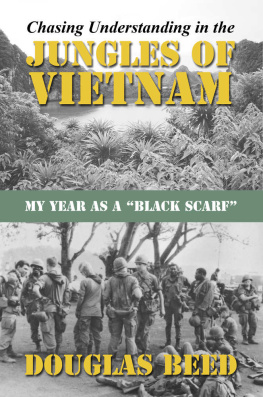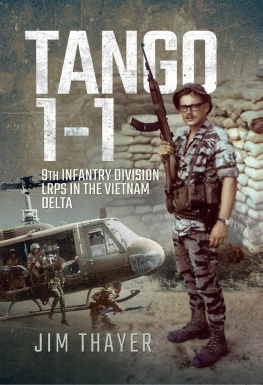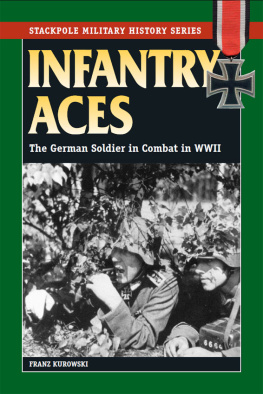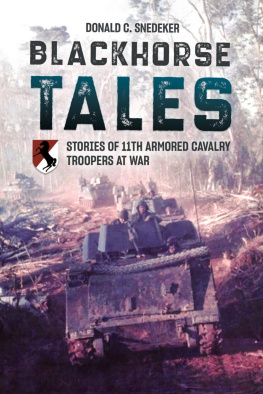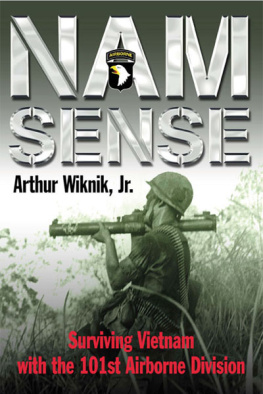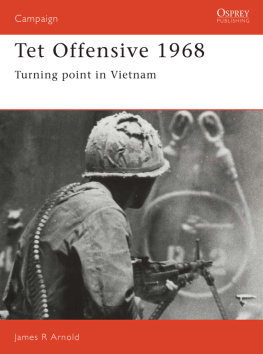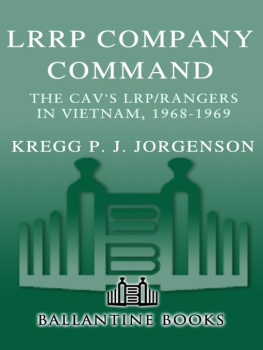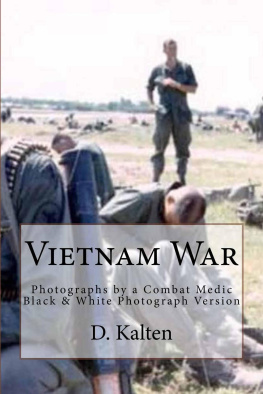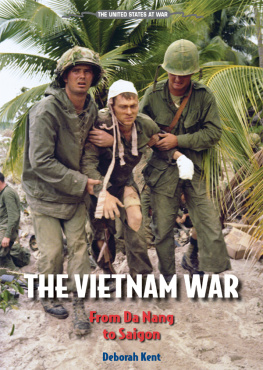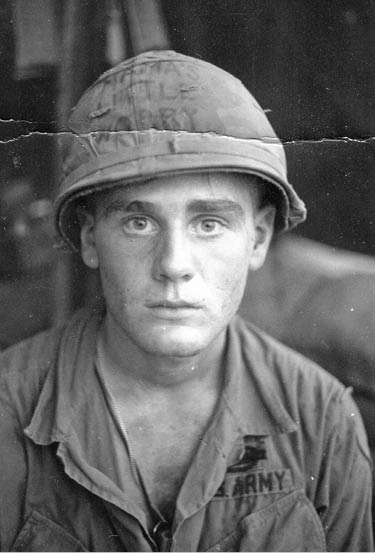Foreword
December 1968
Approximately 40 miles Northwest of Saigon
I had been on-line in Vietnam for less than a week, and already I understood there was only one certaintythere were many things to learn just to survive, and I wasnt learning them fast enough. I was in a three-man position on the kill zone of a night ambush on a fresh trail (one showing recent activity). One of the more experienced men in the group was awake on his 2 hour watch, and my watch was coming up. I needed to sleep, but I just couldnt fall off.
Suddenly about ten to fifteen feet in front of me I heard a frighteningly loud sound. RRHHHHRR, RRHHHRR, RRHHHRR Fuck You, Fuck You, Fuck You! I thought, Holy shit, an enemy is right out in front of my position, behind the kill zone! That NVA fucker is taunting me and trying to scare me into revealing my exact position. I had never been so awake in my life. I must have gasped involuntarily because immediately I heard a very soft chuckle coming from the guy on watch right next to me! What the hell!?
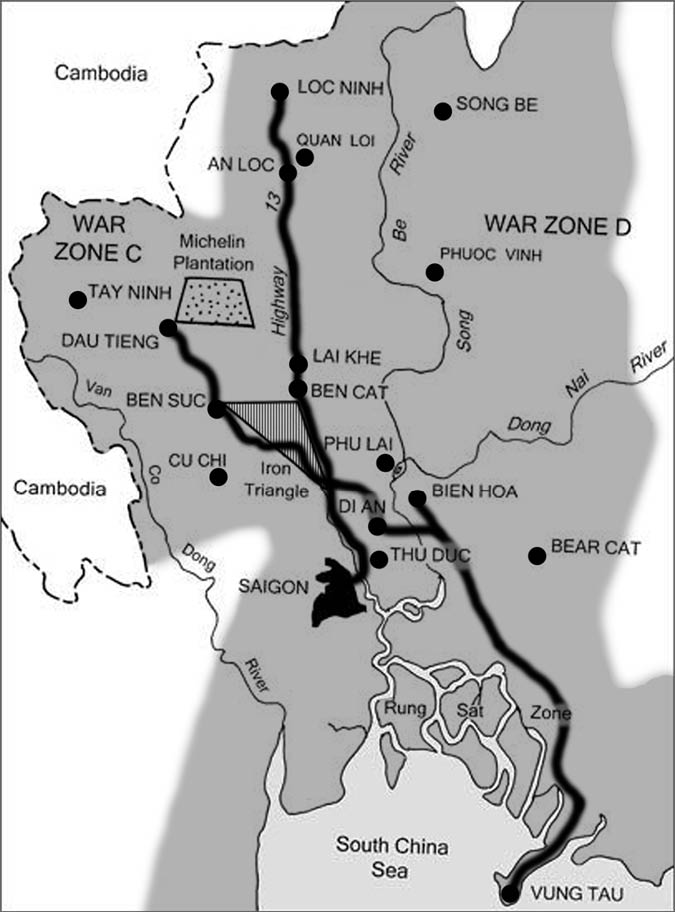
Area of Operations for the Black Scarves, 1968-69. The shaded areas indicate very heavy application of Agent Orange.
Introduction
For more than forty years, I just wanted to get on with my life and not try storing or remembering or writing or even telling many stories about my time in the army. After being back in the States from Vietnam for a couple months in 1969 and 1970, I didnt jump or twitch at loud or unexpected noises. After a year, I had bad dreams very infrequently, and after a couple of years of drinking heavily, which helped put space between me and my ghosts, I met Penny. I fell in love, got married and successfully went back and finished college. I was starting to live a life again. Things seemed to work better when I would keep the parts of my life concerning my army time and the time just after returning home pretty much separated from the rest of my life. I could occasionally tell a funny war story or two if the subject came up, and I would then seemingly return to my normal life.
Now that I have been persuaded to record my army memories by my nieces and nephews, I have realized that my approach to recovery has had a bearing on my memory of those times. In many cases, I find it difficult to recall with clarity the details of certain events, as well as the locations and timelines. The events in this account are as accurate as I can recall them, and I hope they are close enough to enable my readers to at least understand the essence of my experiences. As the lyrics of the World War II song A Nightingale Sang in Berkeley Square say, I may be right; I may be wrong. But Im perfectly willing to swear. This is the best I can do.
I would also emphasize for readers not in my generation: MY infantry was not a volunteer force; most of us were involuntarily placed into our predicament. By 1968, when I entered the army, many members of my generation were not supporting the Vietnam War and were against it. I am not fooled by General Westmorelands (and others) post-war statements that most persons that went to Vietnam were volunteers. He classifies the entire number of men that enlisted in the military as volunteers instead of regarding the vast majority of them as men who involuntarily enlisted to escape the draft.
One of the consequences of an inequitable draft system and the armys recruiting methods was that the army infantry of which I was a part consisted almost entirely of soldiers that were drafted and who were either against the war initially or who would turn against it by the time they had been in-country (Vietnam) for a few months.
There are soldiers in the military that are what I call Warriors. These are men and women who are drawn into life in the military and to the adrenaline rush and severe challenges of the life of combat. We should all thank them for their courage and for their service and sacrifices to our country. However, this book is not an account of a warrior; rather, it is an account of one of many young men ordered by their government to disrupt their plans and dreams and instead, serve their country. We who ended up in the infantry were all required to learn the skills of war-making and to perform acts of war. We too served and sacrificed but most of us did not have the motivation of a warrior. Pride of service turned out to be a very different notion for us than it is today with an all-voluntary force. I believe our experiences were akin to the drafted combat soldiers throughout our countrys long military history.
So as you begin reading my account, keep in mind that we involuntary draftees in Mike Platoon for the most part learned and performed our jobs well. We all endured frequent short firefights that were in line with our mission. Most of them all blend into one morphed memory of us doing our job well and efficiently. When I am asked, What did you do in the war? these are the stories that creep into my mind. Have at it.
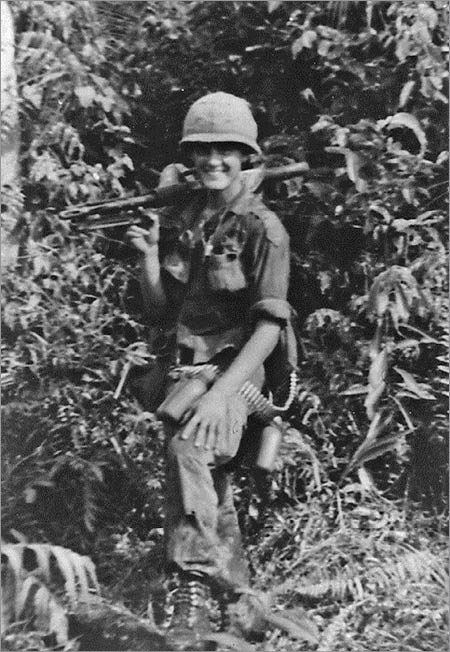
Author humping his M60 machine gun in the bush
PART 1
Stateside
May you be cursed to live in interesting times. Daniel Dahlquist
(Adapted from The Chinese Curse )
Chapter 1
Joining the Club
11 Months earlierJanuary 1968, Cedar Rapids, IA
My story began in January 1968 as I was just finishing my first two years of college at Ellsworth Junior College in Iowa Falls, IA. My father had died when I was a junior in high school, and I had no money and no idea of what I wanted to do with my life. I had had a great liberal arts experience during the past two years. I had studied some things that didnt interest me; I had also discovered several exciting subjects that I might like to pursue. The difficulty with that academic situation was that the local Selective Service Board would draft a man if he didnt successfully complete thirty credit hours in a specific degree program each academic year. I would have liked to experiment with a couple of interesting majors, but I didnt have the money, and it was apparent that the Selective Service wouldnt allow me the time to explore. Besides, all of the four-year schools that I would have attended next were much more expensive, so I didnt transfer. Instead, I let my student deferment lapse on January 31, 1968.
Two days later, on February 2, I received a notice in my mailbox to report in ten days for my pre-induction medical examination at Fort Des Moines. The local county draft board had processed my change of status from 2S (student deferment) to 1A (draft-eligible) and had mailed the notice, all in the span of one eight-hour day. Wow! I have always felt that many other federal agencies could learn a few things about efficiency of operations if they would take the time and energy to study the Linn County Selective Service Boards organization in the early months of 1968. I can tell you with unconditional conviction that the US Army never came close to that level of competence. The door into what we later would call the great green meat grinder was now wide open for me to enter.

